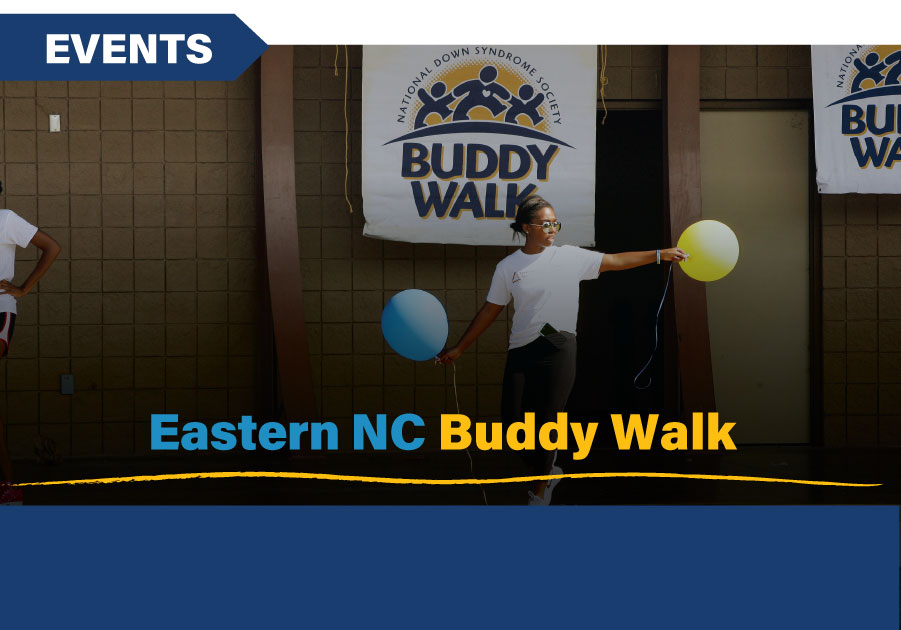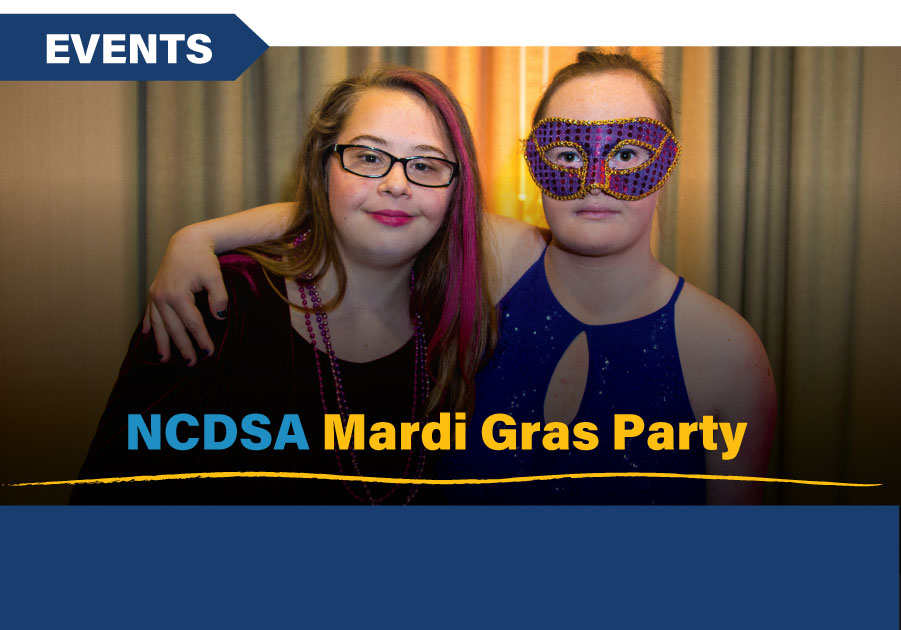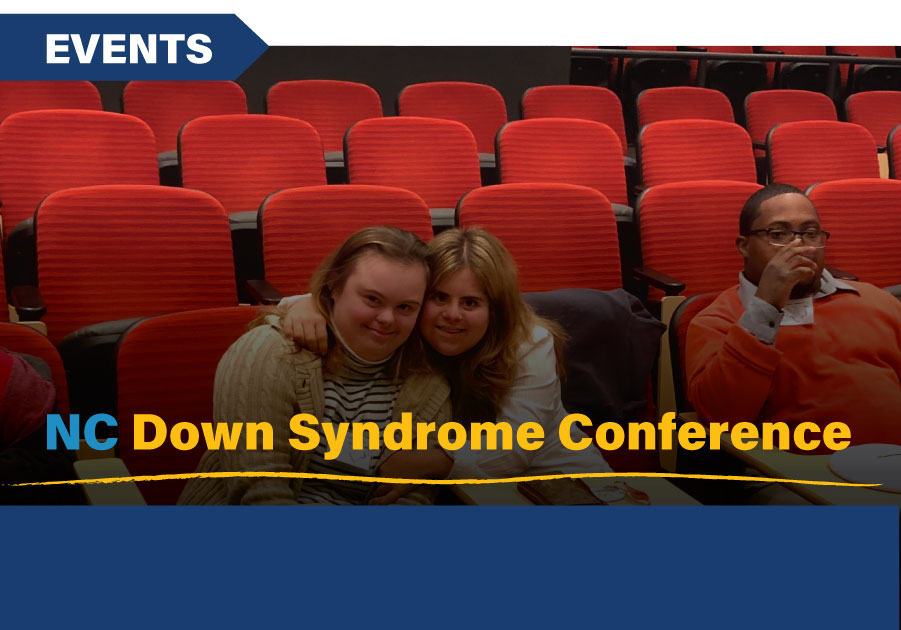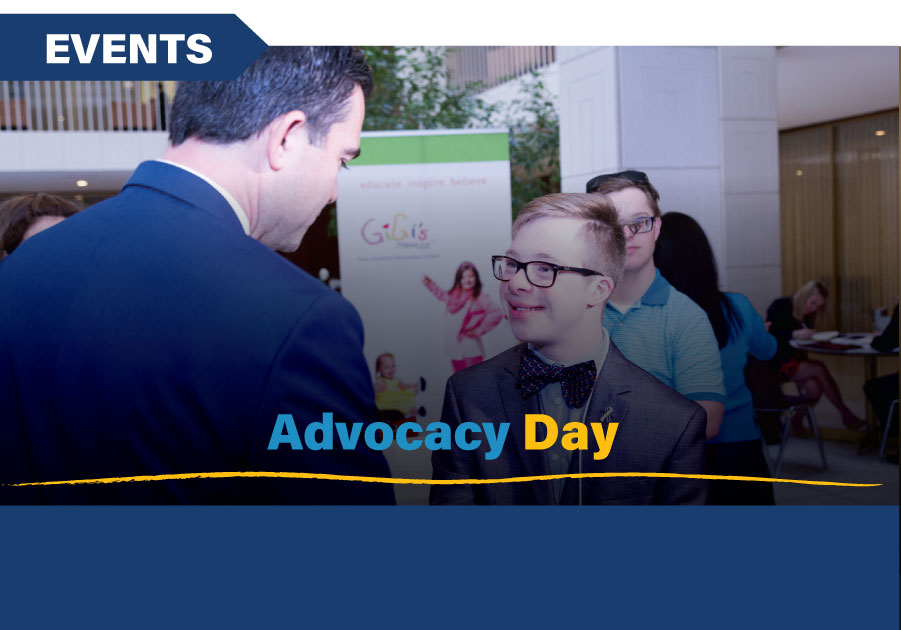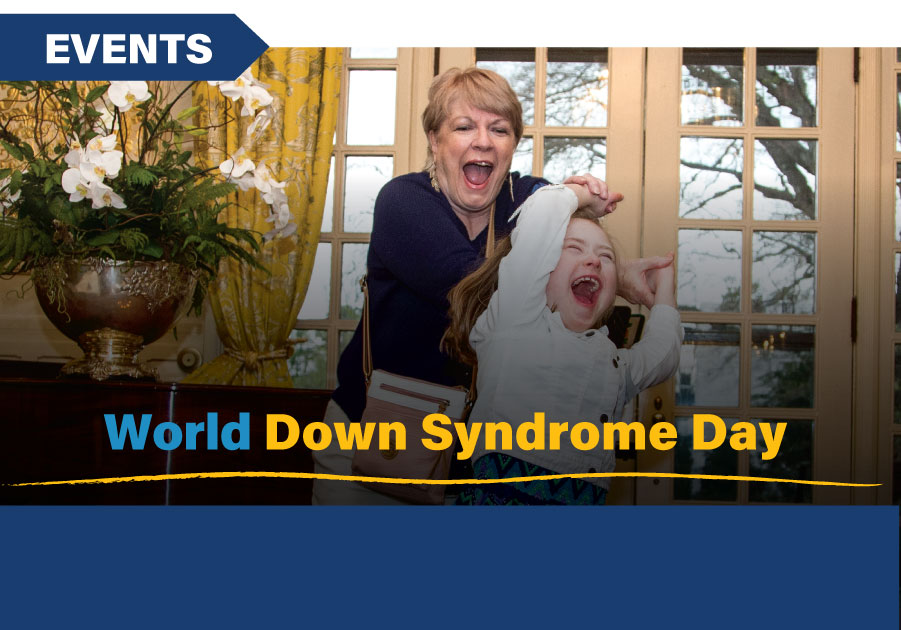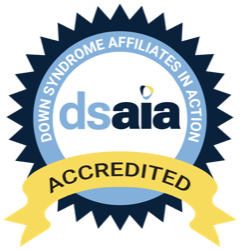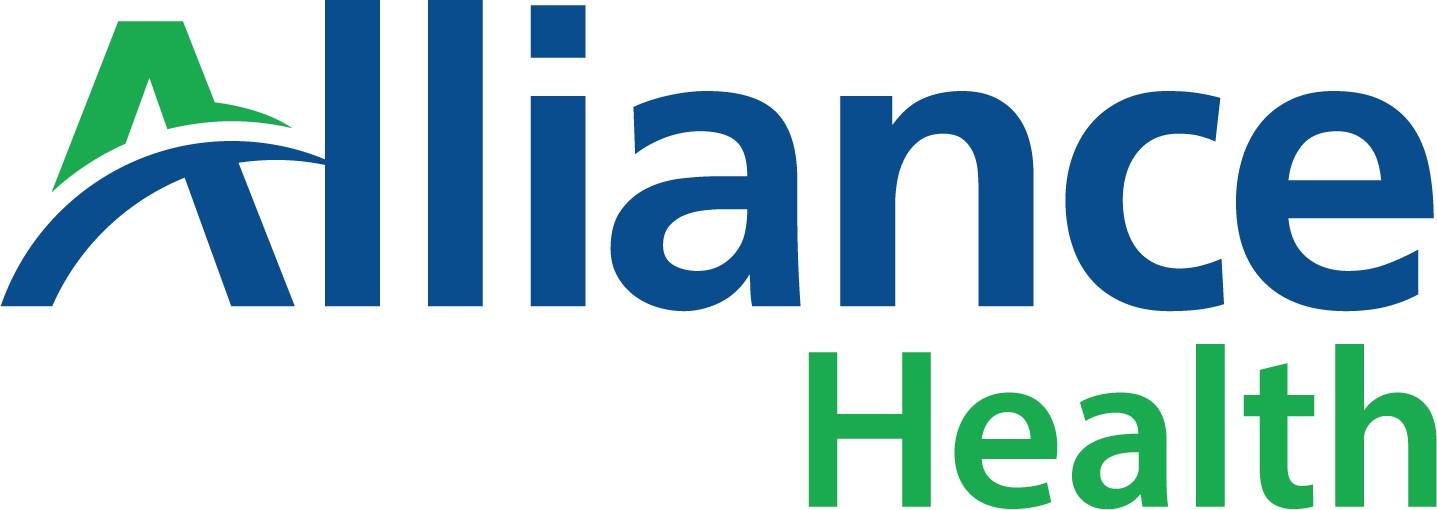North Carolina Down Syndrome Conference
Click Here to Register for the Conference
Online registration closes April 21st
Sponsored By:
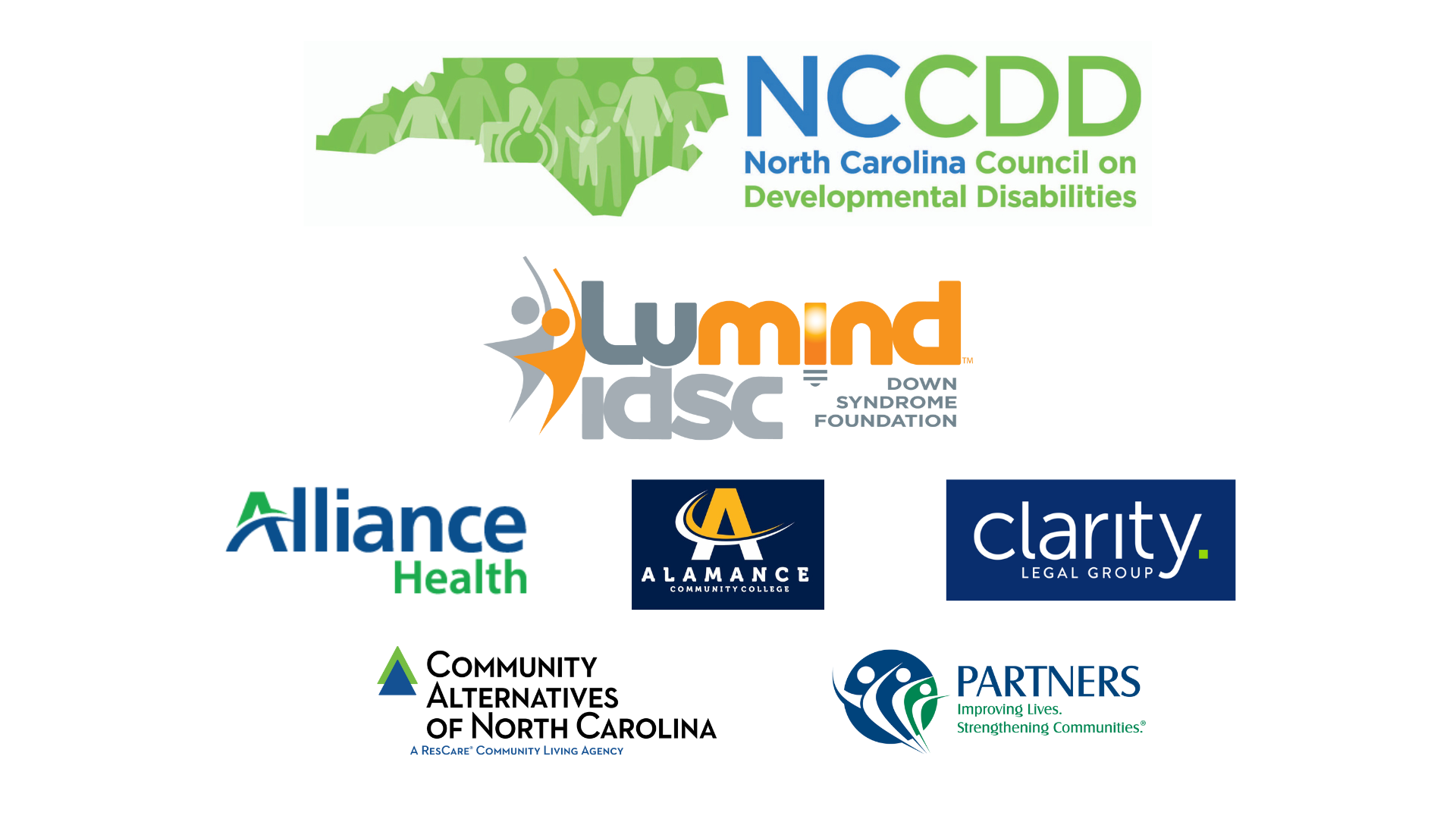
Saturday, April 27, 2024
Schedule
| 8:30 – 9:30 Registration and Breakfast |
| 9:30 – 10:45 Welcome and Keynote/Self-advocate track |
| 10:45 – 11:00 Break |
| 11:00 – 12:15 Breakout Session 1 |
| 12:15 – 1:30 Lunch |
| 1:30 – 2:45 Breakout Session 2 |
| 2:45 – 3:00 Break |
| 3:00 – 4:15 Breakout Session 3 |
| 4:15 – 4:30 Door Prizes/Certificate of Completion |
*Schedule and Content Subject to Change
Welcome and Keynote Session
Presented by: Brian Chicoine, MD
Presentation: Addressing Bias in Health Care for People with Down Syndrome
Presentation Description: Progress has been made in reducing bias against people with Down syndrome. However, significant bias persists in health care as evidenced by the experiences of many people with intellectual disabilities during the COVID-19 pandemic. In this session, Brian Chicoine, MD, will describe bias in health care, define ableism, share clinical examples, and facilitate a discussion of strategies to address bias in health care and the role individuals with Down syndrome and their families can play in the process.
Presenter Biography: Brian Chicoine, MD, is the medical director of the Advocate Medical Group Adult Down Syndrome Center in Park Ridge, Illinois. He is on the faculty of the Family Medicine residency at Advocate Lutheran General Hospital. He received his medical degree from Loyola University of Chicago Stritch School of Medicine and completed his family medicine residency at Lutheran General Hospital. In 1992, Dr. Chicoine co-founded the Adult Down Syndrome Center, which has served and documented the health and psychosocial needs of over 6,000 adolescents and adults with Down syndrome since its inception. Dr. Chicoine has provided medical care for adults with intellectual disabilities for over 30 years and has presented and written extensively on caring for adults with Down syndrome.
Self-advocate Track
Presentation: Healthy Active Future and Goal Map Worksheet
Presentation Description: In this session, self advocate participants will learn about the transition to adult life and explore what it means for them to live a healthy, active lifestyle. Participants will be introduced to a new, interactive digital goal planning tool, which shows how to break down big dreams for adult life into achievable action steps. Participants will come away with a dream, a goal, and an action step to guide them in developing a vision statement in the next session!
*No need to bring technology. Each participant will be provided with an iPAD and/or Chromebook to borrow while trialing the tool.
Presenter Biography: Jacklyn Boheler, MS, OTR/L is the project coordinator of Work Together NC, a statewide project focused on improving systems of support involved in the transition to adulthood for people with IDD. Jacklyn was awarded one of the 2023 Leadership & Advocacy awards through the NC Council on Developmental Disabilities. Jacklyn’s primary areas of advocacy include disability inclusion/universal design in the workplace, the transition to adulthood for people with intellectual and developmental disabilities, inclusive post-secondary education, and neurodiversity-affirming approaches.
Presentation: What’s the Plan?
Presentation Description: In this session, Mandy will cover the following:
Creating a personal vision statement is a great way to summarize your personal goals and dreams for the future. In this session, we will explore how your vision statement can let others know what you want to be, what you want to do, where and how you want to live, and how you want to participate in your community.
Presenter Biography: Mandy Sonnenberg is the Assistant PTI Manager at ECAC. She is the mother of three children and a retired military spouse. Her family has resided in North Carolina since 2011. Mandy’s oldest son is diagnosed with ADHD and PTSD and her middle daughter was diagnosed with ASD, Dyslexia, and Dyscalculia. She is passionate about working with other families with special needs children with an emphasis on helping military families. In 2016, Mandy joined PAVE of Washington with the Specialized Training for Military Parents (STOMP) program as an instructor. As a STOMP instructor she has traveled to bases in the United States and Overseas training military parents of special needs children and professionals. She has volunteered as a liaison for military families for several of her husband’s commands prior to him retiring. Mandy has a Bachelor’s degree in Elementary Education Interdisciplinary Studies from Liberty University and is a former High School Special Education teacher. In her free time Mandy enjoys boating, riding horses and spending time at the beach with her family.
Presentation: Choosing Healthy Foods for a Healthy Body
Presentation Description: In this session, you will learn simple tools to make healthy choices about what to eat and drink. We will talk about why it is important to eat lots of different kinds of foods, how different foods help our bodies stay healthy and strong, and practice choosing which foods are healthy choices for every day and which foods to eat less often. This presentation will be interactive and encourage self-advocates to participate and practice what we learned.
Presenter Biography: Emmy Clarke is a Registered Dietitian working in research and education at the University of North Carolina Center for Health Promotion and Disease Prevention. For the past year and a half, Emmy has been working with a team at UNC to adapt an existing nutrition and physical activity program to meet the needs of families of young children with Down syndrome.
Presentation: On the Move
Presentation Description: Join us for an engaging session as we delve into the important topic of staying active and safe for individuals with Down Syndrome. In this presentation, we will explore the significance of physical activity in enhancing overall well-being and quality of life for individuals with Down Syndrome.
Through vivid visuals and insightful discussions, we will address various aspects related to staying active, including the benefits of exercise, suitable activities for different age groups and abilities, and strategies to ensure safety during physical activities. Our aim is to empower individuals with Down Syndrome with practical knowledge and tools to incorporate safe and enjoyable physical activities into their daily routines.
From understanding the importance of regular exercise to learning how to navigate potential safety concerns, this session will provide valuable insights and practical tips to help lead healthy, active lifestyles. This presentation promises to be an informative and inspiring guide to staying on the move while prioritizing safety and well-being.
Presenter Biography: Marianne Georgiou is a wife, and mother of 3; one of who is a child with exceptional needs. With years of experience in the medical field and serving the special needs community, she is passionate about serving and advocating for those with exceptional needs. She is also the Founder and President of A Voice For All Foundation and serves in the Special Needs Ministry of her local church. Marianne is passionate about awareness and education since they are essential to changing social and cultural stigmas as they lead to growth, acceptance and inclusion. She is driven by the fierce love for her children and the pursuit of what sets her heart on fire – to bring a voice to children while at play and empower them with the confidence to grow, learn and thrive to the best of their abilities.
Presenter Biography: Lauren Cecilia Persons has been working with individuals with developmental disabilities for over 13 years. SHe has extensive experience working with a wide range of ages, abilities and severity of problem behavior in the school, clinic, home and community setting. Ms. Persons received her M.Ed in Applied Behavior Analysis from The University of Hawai’i. Her areas of interest include adaptive behaviors programming lending to optimal outcomes in adulthood, including teaching the skills needed to target meaningful goals for the child and family. Driven by a commitment to collaborative care, Ms. Persons focuses on fostering partnerships among all service providers to ensure holistic support for each child. Her approach emphasizes open communication and teamwork to create tailored strategies that meet the unique needs of every individual and family.
Presentation: Who’s Got Your Back?
Presentation Description: In this session, Mandy will cover the following:
A circle of support is a group of people YOU choose to invite to come together in friendship and
support, for the purposes of protecting your interests into the future. We will discuss who you might consider in your circle of support.
Presenter Biography: Mandy Sonnenberg is the Assistant PTI Manager at ECAC. She is the mother of three children and a retired military spouse. Her family has resided in North Carolina since 2011. Mandy’s oldest son is diagnosed with ADHD and PTSD and her middle daughter was diagnosed with ASD, Dyslexia, and Dyscalculia. She is passionate about working with other families with special needs children with an emphasis on helping military families. In 2016, Mandy joined PAVE of Washington with the Specialized Training for Military Parents (STOMP) program as an instructor. As a STOMP instructor she has traveled to bases in the United States and Overseas training military parents of special needs children and professionals. She has volunteered as a liaison for military families for several of her husband’s commands prior to him retiring. Mandy has a Bachelor’s degree in Elementary Education Interdisciplinary Studies from Liberty University and is a former High School Special Education teacher. In her free time Mandy enjoys boating, riding horses and spending time at the beach with her family.
Presentation: Personal Hygiene
Presentation Description: Taking care of our bodies is an important task. Individuals with Down syndrome need to take care of their skin, nails, and other grooming activities to maintain good health. In this interactive workshop, participants will learn practical strategies to manage their personal hygiene. Resources will be shared.
Presenter Biography: Katie Frank, PhD, OTR/L has worked as an occupational therapist at the Adult Down Syndrome Center since 2016 and in the field of occupational therapy since 2001. She earned her degree in occupational therapy from Saint Louis University. She earned her PhD in Disability Studies from the University of Illinois at Chicago. Most of her work has been with individuals with Down syndrome of all ages. Dr. Frank’s experience includes treatment and evaluation as well as facilitating groups for people with Down syndrome, conducting trainings for staff, families, and caregivers, and offering a variety of other educational opportunities across the United States and internationally. Her research has been published in peer-reviewed journals. She is the immediate past President of DSMIG-USA.
Presentation Description: Join us in the preparation of a nutritious snack (multigrain jars with layers of yogurt, fresh fruit, chia seeds, and more!) as we discuss what self-care and self-advocacy can look like in both life and work. This workshop will be hands on and encourages participation!
Presenter Biography: Kathryn Hubert founded Chez Genèse, an award-winning French café in Greensboro, NC in 2018. Chez Genèse provides community & inclusion by training and employing adults with disabilities, which make up 50% of the team. Kathryn has degrees in Culinary and Hospitality Management and spent a year in France studying French culture and food. Kathryn and her team are on a mission to change the way our world views & employs humans with disabilities.
Breakout Session One
Presentation: Is it sensory or is it behavior and can I change it?
Presentation Description: Problematic behaviors can impact the independence and community participation of individuals with Down syndrome. These problematic behaviors can include difficulties with transitioning between activities or places, tolerating medical procedures or devices, staying on task or paying attention, and completing self-care activities, to name a few. Sometimes it can be challenging to determine the reason for these actions. Is it sensory or is it behavior? In this interactive presentation, causes for behavior change and how to determine whether the change is a sensory need or a behavior issue will be discussed. Additionally, practical strategies will be shared to address both sensory and behavioral needs of individuals with Down syndrome.
Presenter Biography: Katie Frank, PhD, OTR/L has worked as an occupational therapist at the Adult Down Syndrome Center since 2016 and in the field of occupational therapy since 2001. She earned her degree in occupational therapy from Saint Louis University. She earned her PhD in Disability Studies from the University of Illinois at Chicago. Most of her work has been with individuals with Down syndrome of all ages. Dr. Frank’s experience includes treatment and evaluation as well as facilitating groups for people with Down syndrome, conducting trainings for staff, families, and caregivers, and offering a variety of other educational opportunities across the United States and internationally. Her research has been published in peer-reviewed journals. She is the immediate past President of DSMIG-USA.
Presentation: Finding a Dental Home
Presentation Description: In this session you will learn practical strategies that you can use at the dental office and at home to promote good oral health from the perspective of a dental hygienist and a parent with lived experience. Regular dental care is important for good oral health, but many children and youth with Down Syndrome, families, and caregivers face challenges accessing this dental care. In this session, we will discuss the importance of a dental home to promote oral health for children and youth with Down Syndrome. We will share strategies that can be used during a dental visit to accommodate needs, partner with the dental provider, and create a positive experience. We will also discuss strategies to promote good oral health and make brushing easier at home. These practical strategies and resources can be utilized by families, caregivers, and providers to improve oral health outcomes and promote whole person health.
Presenter Biography: Lauren Howard has over 25 years professional experience working to promote the health of children and adults with disabilities. Lauren currently serves as the Director of the North Carolina Office on Disability and Health, part of the Division of Child and Family Well-Being, North Carolina Department of Health and Human Services. The Office on Disability and Health works to addresses health disparities and promote health equity, ensuring access and inclusion of children and adults with disabilities in public health activities. Lauren has a Master of Science in Rehabilitation Psychology and Counseling and extensive background related to Americans with Disabilities Act, accessibility, and inclusion. As a person with a disability and mother of a child with special health care needs, Lauren also brings lived experience to her work.
Presenter Biography: Mahala Turner currently serves as the Family Liaison Specialist at the Division of Child and Family Well-Being, North Carolina Department of Health and Human Services. Mahala assists and provides leadership to staff on the development and promotion of children’s health services and family-related issues to ensure a family-centered, culturally sensitive, and community-based approach to services for children with special healthcare needs. Prior to working at NCDHHS, she was the Family Support Specialist with North Carolina Down Syndrome Alliance. She holds both a Bachelor’s and Master’s degree in Special Education and was a Special Education teacher for 12 years. Most importantly, she is the parent to 6-year-old Beau…. who happens to have Down syndrome. In her free time Mahala enjoys reading, going for outdoor walks, and visiting family in Alabama.
Presenter Biography: Wendy Schwade has worked as a dental hygienist for over 36 years. After completing her Bachelor of Science from the University of North Carolina at Chapel Hill, she began her career working with individuals with intellectual and/or developmental disabilities. She spent over 10 years working as a clinical dental hygienist before transitioning into dental public health. She retired from full time work in 2018 and was awarded “The Order of the Long Leaf Pine” by the state of North Carolina. In 2020, she began working as a Program Consultant for the Whole Child Health Section within the Division of Child and Family Well-Being, focusing on children and youth with special health care needs.
Presentation: IEP Road Trip
Presentation Description: In this session, you will learn about key parts of the IEP and the rules of the road. We will cover a lot of territory from Parent Concerns to Present Levels of Performance to Goals and beyond. You will learn how to navigate roadblocks and detours that may occur along the way. Upon reaching our final destination, passengers will have a better understanding of special education terminology, the IEP process and will know how to prepare for and participate in IEP meetings.
Presenter Biography: Doreen Byrd is the Lead Parent Educator at ECAC. Doreen has been with ECAC for the past 20 years. She is the parent of two adult children with disabilities, but Doreen has been involved with families facing disability-related challenges throughout her life. With an educational background in psychology, the education of others has also been a consistent focus. In her many roles, Doreen has provided instruction to children and adults, individual assistance with special education issues, conducted group trainings, and taken advantage of opportunities to effect system-level change. When not at work, Doreen enjoys gardening, cooking, and being active with her church. She loves to explore the natural world and the Blue Ridge Parkway holds a special place in her soul.
Presentation: Home Strategies for Challenging Behaviors
Presentation Description: It’s essential to approach challenging behaviors at home with empathy and effective strategies. Understanding your child’s needs and emotions is crucial. Implementing clear and consistent communication, positive reinforcement, and setting realistic expectations can contribute to a healthier home environment. Join us at the conference to explore practical tips and strategies that not only support your child but also help you navigate and manage challenging behaviors effectively.
Presenter Biography: Sara Rabinowitz is a Licensed Clinical Social Worker, who has worked with individuals with Developmental Delays and Disabilities, across the lifespan, for 25 years. For the past 17 years she has specialized in pediatric school social work, with a particular focus on the special needs population. Sara’s passions include working with families and siblings, early childhood social-emotional development, play therapy and behavior support.
Presenter Biography: Cynthia Ramirez is a BCBA (board certified behavior analyst). She currently works at Frankie Lemmon as the behavior support specialist. She works diligently to collaborate with all teachers to help best support and meet the needs of their students. She has been in the behavior analysis field for about 7 years. She is originally from New Orleans where she received her bachelor’s degree in psychology. Then she moved to Boston to complete her master’s degree in behavior analysis. She has worked in a variety of settings, which include centers, homes, and schools with a wide range of kids aged 1 to 17 years old.
Presentation: Complete Disability Planning: Creating Your Legal and Financial Plan for Now, Later, and After You’re Gone
Presentation Description: Parents of a child with a disability often don’t know where to start when it comes to creating a meaningful plan for themselves & their child now, later, & after they’re gone. Complete Disability Planning is the process of creating an estate plan & special needs trust, a retirement & financial plan for the parents, a financial support plan for the child, & a community resource plan for how the child can be supported for the rest of their life. Join CEP as they discusses the absolute necessary planning steps that all parents should take for themselves & their children when addressing the needs of a child with a disability, including: Creating an Estate Plan catered to maintaining public benefits, Planning for Minor & Adult Guardianship & alternatives, creating a savings & retirement strategy to prepare your entire family for transition, & navigating eligibility for local public & non-profit resources.
Presenter Biography: Paul Yokabitus is a talented and experienced Estate Planning Lawyer in Cary, NC who was born and raised in Grand Rapids, Michigan. Paul attended Campbell University School of Law and later planted his roots in the Cary community. His focus on the client-attorney relationship and the peace of mind of his clients sets Paul apart from other traditional lawyers. Paul takes his fiduciary role very seriously. His relationship-centered philosophy emphasizes a focus on solutions rather than just documents and deliverables. He believes in focusing on the client’s goals and pain points – not a stereotypical “one-size-fits-all” method. Paul actually sits down with prospective clients, discusses their specific family and financial concerns, educates them on how the law works in North Carolina, and works with the clients to determine how their goals can be accomplished. Armed with that information, Paul then crafts a legal strategy tailored to the client’s unique goals and circumstances.
Lunch
Breakout Session Two
Presentation: Preparing for Transition at Any Age
Presentation Description: In this session, Kenzie Clark will cover the main components of transition planning and outline the most essential things to do to prepare for adulthood. No matter your child’s age, Kenzie will review how you can prepare based on where you are currently. You will leave this seminar with a list of actionable items to support a more successful transition to adulthood.
Presenter Biography: Kenzie Clark is the Founder and Manager of Able Transition Consulting. As a former Special Education Teacher, Kenzie saw the need for transition services and sought out a Master’s Degree in Secondary Special Education and Transition through the University of Kansas. The transition process and preparing all families and individuals for high-quality lives is her passion. Kenzie’s master’s degree provides her with expertise and knowledge regarding all things transition. After teaching in the public school system, Kenzie felt called to open the doors of Able Transition Consulting, LLC, to collaborate with and serve families.
Presentation: At-home treatments for common health conditions
Presentation Description: Ear wax, toenail fungus, constipation, dry skin, oh my! These health conditions and others can cause discomfort and negatively impact the quality of life of people with Down syndrome. In this session, Brian Chicoine, MD, will describe common health conditions experienced by people with Down syndrome, share at-home treatments that can be used to address them, and discuss when to consult a health care provider. There will be a Q&A at the end of the presentation.
Presenter Biography: Brian Chicoine, MD, is the medical director of the Advocate Medical Group Adult Down Syndrome Center in Park Ridge, Illinois. He is on the faculty of the Family Medicine residency at Advocate Lutheran General Hospital. He received his medical degree from Loyola University of Chicago Stritch School of Medicine and completed his family medicine residency at Lutheran General Hospital. In 1992, Dr. Chicoine co-founded the Adult Down Syndrome Center, which has served and documented the health and psychosocial needs of over 6,000 adolescents and adults with Down syndrome since its inception. Dr. Chicoine has provided medical care for adults with intellectual disabilities for over 30 years and has presented and written extensively on caring for adults with Down syndrome.
Presentation: Integrating Augmentative and Alternative Communication in the Home (English)
Presentation Description: In this session, participants will learn ways to support a child’s communication in the home. Participants will understand what augmentative and alternative communication (AAC) is and how visuals can be used to support a child’s understanding and expression of language. Participants will learn practical ways to support children’s language and literacy through activities such as shared story reading, songs, and daily routines through modeling and other principles of using AAC.
Presenter Biography: Tonja Recktenwald is a Speech/Language Pathologist and the Assistive Technology Lead for the Durham Public Schools Exceptional Children’s Department. Tonja has worked for DPS for 27 years as an SLP and as an Assistive Technology Team Member and currently the AT Lead; providing students with disabilities from PreK to high school access to the curriculum by using various AT supports for communication and writing. Tonja evaluates students, recommends and obtains communication systems and provides training and support for use of communication devices to school staff and parents.
Presentation: Advocacy Skills Big and Small, Come Learn About them ALL Resource Document
Presentation Description: In this session, you will learn essential advocacy skills that can be applied to a variety of situations and systems. Advocacy skills include pro-active steps that you can take to achieve your desired outcome, and ways to address problems when they do occur. The two biggest systems that people who have children with disabilities will have to navigate are education and healthcare. We will share advocacy tips and strategies, and offer examples of how they can be effective within both of these systems. We will also provide information about a variety of advocacy tools and resources, as well as opportunities to engage in system-level advocacy. Participants will have a chance to share some of their own favorite tips and apply their advocacy skills to scenarios created by the presenters. Time-permitting, there may be an opportunity to discuss situations suggested by participants.
Presenter Biography: Doreen Byrd is the Lead Parent Educator with the Exceptional Children’s Assistance Center (ECAC), NC’s IDEA-funded Parent Training & Information Center. Prior to her almost 25 year career with ECAC, she was a Screening Specialist with Mecklenburg County’s Developmental Evaluation Program for almost 10 years. Doreen is the parent of two adult children with learning disabilities and ADHD. She also experiences ADHD. With an educational background in psychology, Doreen has been involved with families facing disability-related challenges throughout her life. Education has also been a consistent focus. In her many roles, Doreen has delivered instruction to children and adults, supported parents, provided individual assistance with special education issues, conducted group trainings and presentations, and taken advantage of numerous opportunities to effect system-level change. Doreen is a long-time member of the N.C. State Rehabilitation Council and she served on the State Transition Planning Team for many years.
Presenter Biography: Christy Moore joined the Exceptional Children’s Assistance Center in October 2019 as a Parent Educator where she worked to support and provide families with the tools to advocate for their children and effectively navigate the special education system in NC. In April of 2021, she became the Early Intervention Project Coordinator where she focused on training professionals who serve children birth to 5 with developmental concerns/disabilities on family engagement best practices at the service and systems levels. In June 2022, she took on the role of NC’s Family-to-Family Health Information Center Program Lead. In this role, Christy researches, creates and shares health related information and resources to families and professionals, and establishes relationships with other family serving agencies and organizations to create a cohesive network of information, support and referral.
Christy’s lived experience includes being a wife to her husband and mother of two daughters, all of whom have special health care needs.
Presentation: Feeding Your Infant and Toddler with Down Syndrome: Advocacy and Action
Presentation Description: In this session, you will learn about ways to approach feeding your infant or young child with Down syndrome and how to advocate for your child and family with health professionals when it comes to feeding decisions. First, we will present the evidence around different options and supports for breastfeeding, bottle feeding, introducing solid foods, and nutrition in the early childhood years. This Down syndrome-specific information will prepare you to make the best feeding decisions for your child and family. Next, we will share family experiences with discussing feeding decisions with their healthcare provider. Actionable strategies for communicating about feeding with your healthcare provider, when to seek out specialty providers, and how to advocate for your child and family will be covered. The goal of this presentation is that you leave feeling confident and prepared to support your child’s feeding and nutrition through the early childhood years.
Presenter Biography: Dr. Kelsey Thompson, PhD, CCC-SLP is a researcher and speech language pathologist at UNC-CH. She has practiced clinically as a speech language pathologist specializing in feeding for over 8 years. Her research centers on supporting families of infants and young children with diverse needs in order to smoothly transition to solid foods and prevent long-term feeding problems. Dr. Thompson has worked with infants and children with Down syndrome both clinically and through her research. Dr. Thompson is a member of ASHA, a certified SLP, and a volunteer with Feeding Matters.
Presenter Biography: Emmy Clarke, RD, LDN is an implementation advisor with the Children’s Healthy Weight Research Group at UNC-CH’s Center for Health Promotion and Disease Prevention. After graduating from Clemson University with a Bachelor’s in Food Science, Emmy joined Teach for America as a 2014 Greater New Orleans Corps Member. Emmy taught high school science for three years in low income areas and helped found a new charter school in Phoenix in 2016. She completed her dietetic internship through the Maricopa County Department of Public Health and is a Registered Dietitian. Prior to joining the CHWR she worked with the National School Lunch Program at the Arizona Department of Education focusing on school wellness, meal integrity, training, and technical assistance. Emmy is passionate about increasing access to healthy food to children affected by food insecurity.
Presenter Biography: Dr. Agrawal is an assistant professor at the University of North Carolina at Chapel Hill (UNC) and teaches courses in both nutrition and public health to graduate students. She is interested in identifying strategies that promote the nutritional status and quality of life in vulnerable populations. Dr. Agrawal is a Registered Dietitian and was as a clinical dietitian for almost thirty years before entering UNC. She is the MPH practicum advisor for nutrition and a co-chair on the Inclusive Excellence Committee. She is also a member and reviewer with the Accreditation Council for Education in Nutrition and Dietetics (ACEND) – the accrediting agency for preparing students for careers as registered dietitians.
Breakout Session Three
Presentation: Sleep Disturbances in Individuals with Down Syndrome
Presentation Description: In this session, you will learn about various types of sleep disturbances and sleep disorders that are common in both children and adults with Down syndrome. Given that the prevalence of sleep difficulties in children with Down syndrome is at 76%, and as high as 85% in adults with Down syndrome, it is crucial to tackle, treat, and prevent unfavorable sleep outcomes. Recent research and new findings in the area will be presented using a biopsychosocial lens. Sophie Hirsch will cover the following: What types of sleep disturbances are present in individuals with Down syndrome, what possible explanations exist for the heightened risk of these sleep disturbances, what the consequences of poor sleep entail, and what possible treatment recommendations exist.
Presenter Biography: Sophie Hirsch, MA, is a PhD student at the University of North Carolina at Charlotte studying Clinical Health Psychology. While being active clinically in a Federally Qualified Health Center in Gaston County, she enjoys focusing her research on sleep, inflammation, and Down syndrome. She has a brother with Down syndrome, Max, who lives in Germany with her family and who has informed her passion for both her clinical practice and research. Further, Sophie Hirch has been actively volunteering with the Down Syndrome Association of Greater Charlotte and is currently the Philanthropy Chair of the Health Psychology Graduate Student Association. In 2023, Sophie, along with her advisor, Dr. Jane Gaultney, PhD, published a literature review entitled “Sleep Disturbances in Individuals with Down Syndrome – An Overview” in the Journal of Intellectual Disabilities.
Presentation Description: The ABLE account is a state-run savings program for eligible people with disabilities in the United States. It continues to be an area many families have questions about; in terms of its set up, how to effectively use it, and how it complements a special needs trust. You are invited to an interactive, exciting experience to learn about ABLE accounts and Special Needs Trusts with A Special Needs Plan founder Ryan Platt. Learn how ABLE accounts can be an asset to your loved one with Down syndrome and other disabilities.
Presenter Biography: Ryan F. Platt, MBA, ChFC®, ChSNC™, CFBS, founded A Special Needs Plan in 2005 and has been a pioneer in his field. He completed his Special Care Planner Certification at the American College in Bryn Mawr, PA, and his background includes advanced training in estate and tax planning, special needs trusts, government programs, and the emotional dynamics of working with people and families with loved ones with special needs. He’s passionate about meeting with families, learning their concerns, understanding their values, and helping them reach their goals. He excels in creating plans that help secure the needs of two generations”
Presentation: Supporting people with Down syndrome in living a healthy lifestyle
Presentation Description: It can be challenging for all of us to live a healthy lifestyle. This session will explain why it is important for individuals with Down syndrome to learn how to live a healthy lifestyle, what skills need to be learned, and how caregivers can support individuals with Down syndrome learn these skills. This session will provide specific strategies and resources to help improve the quality of life of people with Down syndrome across their lifespan.
Presenter Biography: Katie Frank, PhD, OTR/L has worked as an occupational therapist at the Adult Down Syndrome Center since 2016 and in the field of occupational therapy since 2001. She earned her degree in occupational therapy from Saint Louis University. She earned her PhD in Disability Studies from the University of Illinois at Chicago. Most of her work has been with individuals with Down syndrome of all ages. Dr. Frank’s experience includes treatment and evaluation as well as facilitating groups for people with Down syndrome, conducting trainings for staff, families, and caregivers, and offering a variety of other educational opportunities across the United States and internationally. Her research has been published in peer-reviewed journals. She is the immediate past President of DSMIG-USA.
Presentation: Making Sense of NC Medicaid Plans, Services and Waivers
Presentation Description: This session will offer detailed information about Intellectual and other Developmental Disability (I/DD) services and how to access them:
NC Medicaid
State-funded
Home and Community Waivers and Wait Lists
Tailored Care Management
Participants will also learn about NC Medicaid health plans and the types of funding for I/DD services across the lifespan and making the most of the their insurance. Other topics include how to be involved and make your voice heard in the public health system.
Presenter Biography: Neva Bartholomew, MD, MPH is a Board-Certified Family Medicine Physician with 28 years of experience in a wide range of clinical settings, including academic, public health and community practice. Prior to joining Partners in 2022 as the Deputy Chief Medical Officer for Physical Health, Dr. Bartholomew spent the last 15 years of her career providing primary care to complex patients in state psychiatric hospitals and prisons. As the mother of a child with complex needs, including Autism and epilepsy, she understands the challenges families and patients face in our fragmented medical system. She came to Partners to use her passion, skills and experience to meet the whole person healthcare needs of our most vulnerable citizens.
Presenter Biography: Allison Crotty, MSW, LCSW is a Licensed Clinical Social Worker with many years of experience in Behavioral Health and Intellectual and Developmental Disability managed care, and in the healthcare field. She is the Senior Director of Member Services at Partners, leading the PartnersACCESS Call Center and Member Engagement teams. Allison is mother of, and advocate for, 32-year-old Samantha, who has severe intellectual and developmental disabilities and gives the best hugs ever. Allison’s career encompasses multiple settings, including hospitals, health departments, private practice, primary practice integrated care, Medicaid managed care, and Medicare healthcare quality. Allison believes strongly that the member experience is critical to improvement in whole health services. She is dedicated to ensuring Medicaid members have a voice and full participation in their communities and the Intellectual/Developmental Disability system of care.
Presentation: Play. Connect. Grow.
Presentation Description: In this session, participants will explore a variety of multi-sensory games and play activities for infants and toddlers that support the achievement of developmental milestones and healthy caregiver attachments. Research indicates that all children, including those with Down Syndrome, benefit from the intentional use of toys and activities that promote the development of gross motor milestones, cognition, and sensory processing skills. The presenters, two occupational therapy practitioners, have expertise in engaging infants and toddlers and their caregivers in the co-occupation of play to support milestone achievement. Participants will review the development of motor, cognitive, and sensory milestones, and explore a variety of simple, low-stress play activities that parents can engage in to support their child’s development. Video cases will be utilized to demonstrate specific play activities and skills. As we present specific toys, games, and activities, we will discuss methods of customizing play to meet the unique needs of the child.
Presenter Biography: Annabeth Knight, OTD, OTR/L, ATP has worked in pediatrics as an occupational therapist for 12 years. She has served families in a variety of outpatient, school, and early intervention settings. She is currently an assistant professor and the academic capstone coordinator in the Doctor of Occupational Therapy Program at Methodist University. Her practice and research interests include assistive technology, caregiver education, interdisciplinary pediatric practice, and OT’s role in perinatal care.
Presenter Biography: Meredith Gronski, OTD, OTR/L, CLA, FAOTA has been an occupational therapist for almost 20 years and has served children and their families in a variety of home, school, and community-based settings. She is currently an Associate Professor of Occupational Therapy at Methodist University and serving as the Dean of the College of Health Sciences and Human Services. Her practice and research interests include play-based movement & learning, feeding interventions, food allergies, early childhood educator support, and family coaching intervention approaches.









